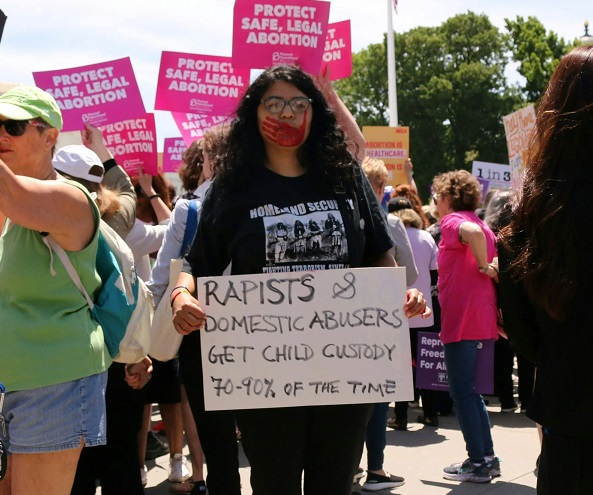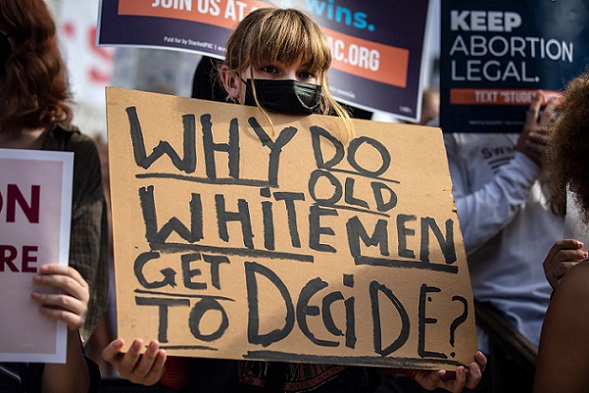GOP Gov. Defends Law Forcing Incest Victims To Carry Pregnancy To Term, Won’t Rule Out Criminalizing IUDs!
FEATURED PHOTO: MISSISSIPPI GOVERNOR TATE REEVES
Yahoo.com, By Peter Wade-ROLLING STONE, Posted May 26th 2022
“Why is it acceptable in your state to force girls who are victims of incest to carry those children to term?” CNN’s Jake Tapper asked Mississippi Governor Tate Reeves, whose state has a trigger law set to ban abortion immediately if the Supreme Court overturns Roe v. Wade. That law, also called a “snapback law,” does not include an exception allowing victims of incest to access abortion care. The only exceptions in the law are for cases of rape and when the life of the mother is in danger.

When asked on last Sunday whether Mississippi would enforce the snapback law if Roe is overturned — which looks increasingly likely thanks to a leaked draft opinion — Reeves told Tapper he would. “Yes, Mississippi does have a trigger law in place,” Reeves said. “It was passed in 2007, and that trigger law will go into effect” if Roe is overturned. Pro-choice governor Gov. Gretchen Whitmer in Michigan, on the other hand, has gone to court in an attempt to prevent the state’s trigger law from going into effect if the Supreme Court nullifies Roe.
When Tapper asked Reeves to “explain why” there are no exceptions in Mississippi’s trigger law, the Republican governor glibly replied, “Well, that’s gonna be the law because in 2007 the Mississippi legislature passed it.”
Reeves defended not having an exception for incest written into the 2007 legislation. “When you look at the number of [abortions] that actually involve incest, it’s less than 1 percent,” he said.
But Tapper pressed Reeves further on the lack of exceptions in the state’s law. “Let me ask you, what about a fetus that has serious or fatal abnormalities that will not allow that fetus to live outside the womb? Is the state of Mississippi going to force those girls and women who have this tragedy inside them to carry the child to term? Are you going to force them to do that?”
Reeves continued to duck the pointed questions, again falling back on the argument that only a “very small” percent of abortions would be affected by the lack of exceptions, as if that somehow erases the problem created by the law or minimizes the potential trauma women would experience.

Reeves also touted his state’s pregnancy resource centers as equipped to help expectant mothers. But as sociologist Katrina Kimport, who has studied these centers in depth, told The New York Times, they are “inadequate” because “the scale of need far exceeds what the centers were able to provide.”
“We’re talking about prenatal vitamins, and they don’t have stable housing,” said Kimport, an associate professor with Advancing New Standards in Reproductive Health at the University of California, San Francisco.
Tapper also pointed out to Reeves that his state has a very poor history of caring for parents and their children. “Mississippi, as you know, has the highest rate of infant mortality in the United States,” he said. “You have the highest rate of child poverty in the United States. Your state has no guaranteed maternity leave that’s paid. The legislature in Mississippi just rejected extending postpartum Medicaid coverage. Your foster care system is also the subject of a long-running federal lawsuit over its failure to protect children from abuse.”
Tapper continued, “You say you want to do more to support mothers and children. But you have been in state government since 2004. You were the state treasurer. Then you were the lieutenant governor. Now you’re the governor, Based on the track record of the state of Mississippi, why should any of these girls or moms believe you?”

Reeves admitted his state has “a long history of poor health outcomes” but danced around the question, making vague promises that he is “focusing every day on fixing the challenges that are before us” and talking condescendingly about “educational opportunities” and “jobs” (as if education and jobs will fix entrenched child poverty, as if child care in America is not prohibitively expensive for many working moms).
Later, Tapper asked Reeves if his state would “target IUDs or Plan B,” which are forms of contraceptives. Again, Reeves dodged the question while refusing to close the door on a possible contraception ban. “That is not what we’re focused on at this time,” he said. “We’re focused on… what the court allows for. The bill that is before the court is a 15-week ban. We believe that the overturning of Roe is the correct decision by the court.”
Reeves’ interview was followed by Sen. Kirsten Gillibrand. The Democrat, responding to what Reeves said, called him “quite paternalistic towards women.”
“He indicated during your conversation that all we need is more education for women,” Gillibrand said. “I was pretty offended by his remarks. He doesn’t look at women as full citizens. He’s taken away their right to make these fundamental decisions about when they’re having children, under what circumstances they’re having children, how many children they’re having, at what point in their life they’re having children.”
She continued, “It’s outrageous that this governor and governors and legislatures across America are going to take this draft opinion, when it is final, and deny women these fundamental life-and-death decisions about their future and about their families.”








